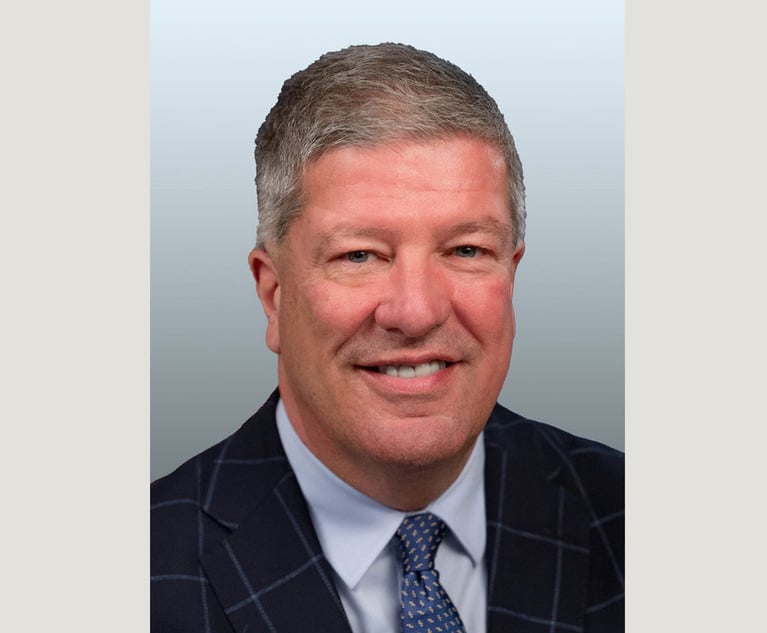Pa. Bar Passage Rates Improve After Historic Low
The passage rate for first-time takers of the July Pennsylvania bar exam showed marked improvement after hitting a new low last year.
October 09, 2017 at 04:20 PM
5 minute read

The passage rate for first-time takers of the July Pennsylvania bar exam showed marked improvement after hitting a new low last year.
Of the 1,075 first-time applicants this year, 81.2 percent passed. Last year, just 75.4 percent of the 1,371 first-time applicants passed the July 2016 exam. That was the lowest passage rate for any July exam for which the state Board of Law Examiners has made data about bar exam passage available.
The passage rate for all test-takers also climbed to nearly 73.6 percent in July 2017 from 69.3 percent last year.
While passage rates have been on the decline nationwide in recent years, there was some cause for optimism this year, even before Pennsylvania's results were released. Judith Gunderson, who took over as the president of the National Conference of Bar Examiners on Aug. 21 following the retirement of longtime president Erica Moeser, said in September that the national average score on the Multistate Bar Exam—the 200-question multiple choice portion of the test—rose 1.4 points over the July 2016 average.
But while the passage rate improved in Pennsylvania this year, the downward trend in the total number of applicants who took the July exam continued, hitting its lowest-ever level with 1,301 test-takers in July 2017. Last year, a total of 1,574 people took the exam in July, compared to 1,799 in July 2015.
Results By School
As was the case last year, Widener University Delaware Law School had the lowest overall passage rate at a Pennsylvania-area school, though the rate itself was an improvement over the school's July 2016 showing. This year, about 57.8 percent of its 71 applicants passed. Last year, only 43 percent of the school's 108 test-takers passed. The school also had the lowest first-attempt passage rate in 2017, with about 66 percent of its 44 first-timers being successful. Though, again, that rate was an improvement over 2016, when only about 45 percent of the school's 93 first-time test-takers passed.
Widener Delaware Law Dean Rod Smolla did not respond to a request for comment.
The highest passage rate for Pennsylvania-area law schools in 2017 was also a repeat of 2016. The University of Pennsylvania Law School saw 97.5 percent of its 40 first-time applicants pass the July exam. The school did not have any applicants this year who had attempted the exam before. Last year, 98 percent of Penn's 50 first-time applicants, along with one applicant who had previously taken the test, passed.
A request for comment from the school was not immediately returned.
Unlike last year, however, Pennsylvania State University's Dickinson School of Law narrowly edged Duquesne University School of Law out for the second-place position for both first-time passage rate and overall passage rate.
Penn State showed huge improvement over 2016 in both metrics. In July 2017, about 90.8 percent of its first-timers passed, compared to only 77.5 percent last year. Meanwhile, the school had an overall passage rate of 85.5 percent this year. In July 2016, its overall passage rate was only 72.5 percent.
The 2017 Dickinson Law class was the last combined law class at Penn State, which now has two law schools: Dickinson Law in Carlisle and Penn State Law in University Park.
“I am so proud of Penn State's bar performance and of the efforts that we are making to support our students,” Hari Osofsky, dean of Penn State Law in University Park, said in a statement. “We are delighted that over 90 percent of the graduates from the last combined class of the Dickinson School of Law at Penn State passed the July 2017 Pennsylvania bar on their first attempt, making us second in the state after the University of Pennsylvania Law School. We are optimistic that moving forward the two separate schools, Penn State Law and Dickinson Law, will achieve similar results.”
Duquesne's July 2017 results, meanwhile, were largely in line with its July 2016 performance, when it had the second-highest passage rate for first-time test-takers. This year, the school saw 90.7 percent of its 108 first-timers pass, while 84.7 percent of its 124 total applicants passed. Last year, nearly 92 percent of its 112 first-time applicants and 82.8 percent of its total 128 applicants passed.
“So many people deserve credit for our excellent bar-pass rates,” Duquesne Law Dean Maureen Lally-Green said in a statement. “The students worked incredibly hard to achieve their personal best. Our faculty dedicated countless hours to their success. Our alumni gave of themselves as mentors. And the university stood behind us at every step of the way. The performance reflects so well the strength of the community we have here at Duquesne.”
The next highest first-time passage rate after Duquesne was the University of Pittsburgh School of Law, with about 85.9 percent of 106 first-time test takers passing. Pitt was followed closely by Temple University's Beasley School of Law, where about 84.6 percent of 162 first-time applicants passed.
The rest of the first-time applicant passage rates at Pennsylvania-area schools were: 79.4 percent at Villanova University Charles Widger School of Law; 76.2 percent at Drexel University Thomas R. Kline School of Law; 74 percent at Widener University Commonwealth Law School; and 73.9 percent at Rutgers Law School.
Zack Needles can be contacted at 215-557-2373 or [email protected]. Follow him on Twitter @ZackNeedlesTLI.
This content has been archived. It is available through our partners, LexisNexis® and Bloomberg Law.
To view this content, please continue to their sites.
Not a Lexis Subscriber?
Subscribe Now
Not a Bloomberg Law Subscriber?
Subscribe Now
NOT FOR REPRINT
© 2025 ALM Global, LLC, All Rights Reserved. Request academic re-use from www.copyright.com. All other uses, submit a request to [email protected]. For more information visit Asset & Logo Licensing.
You Might Like
View All


Stevens & Lee Hires Ex-Middle District of Pennsylvania U.S. Attorney as White-Collar Co-Chair
3 minute read
Judge Tanks Prevailing Pittsburgh Attorneys' $2.45M Fee Request to $250K
5 minute readTrending Stories
- 1Gunderson Dettmer Opens Atlanta Office With 3 Partners From Morris Manning
- 2Decision of the Day: Court Holds Accident with Post Driver Was 'Bizarre Occurrence,' Dismisses Action Brought Under Labor Law §240
- 3Judge Recommends Disbarment for Attorney Who Plotted to Hack Judge's Email, Phone
- 4Two Wilkinson Stekloff Associates Among Victims of DC Plane Crash
- 5Two More Victims Alleged in New Sean Combs Sex Trafficking Indictment
Who Got The Work
J. Brugh Lower of Gibbons has entered an appearance for industrial equipment supplier Devco Corporation in a pending trademark infringement lawsuit. The suit, accusing the defendant of selling knock-off Graco products, was filed Dec. 18 in New Jersey District Court by Rivkin Radler on behalf of Graco Inc. and Graco Minnesota. The case, assigned to U.S. District Judge Zahid N. Quraishi, is 3:24-cv-11294, Graco Inc. et al v. Devco Corporation.
Who Got The Work
Rebecca Maller-Stein and Kent A. Yalowitz of Arnold & Porter Kaye Scholer have entered their appearances for Hanaco Venture Capital and its executives, Lior Prosor and David Frankel, in a pending securities lawsuit. The action, filed on Dec. 24 in New York Southern District Court by Zell, Aron & Co. on behalf of Goldeneye Advisors, accuses the defendants of negligently and fraudulently managing the plaintiff's $1 million investment. The case, assigned to U.S. District Judge Vernon S. Broderick, is 1:24-cv-09918, Goldeneye Advisors, LLC v. Hanaco Venture Capital, Ltd. et al.
Who Got The Work
Attorneys from A&O Shearman has stepped in as defense counsel for Toronto-Dominion Bank and other defendants in a pending securities class action. The suit, filed Dec. 11 in New York Southern District Court by Bleichmar Fonti & Auld, accuses the defendants of concealing the bank's 'pervasive' deficiencies in regards to its compliance with the Bank Secrecy Act and the quality of its anti-money laundering controls. The case, assigned to U.S. District Judge Arun Subramanian, is 1:24-cv-09445, Gonzalez v. The Toronto-Dominion Bank et al.
Who Got The Work
Crown Castle International, a Pennsylvania company providing shared communications infrastructure, has turned to Luke D. Wolf of Gordon Rees Scully Mansukhani to fend off a pending breach-of-contract lawsuit. The court action, filed Nov. 25 in Michigan Eastern District Court by Hooper Hathaway PC on behalf of The Town Residences LLC, accuses Crown Castle of failing to transfer approximately $30,000 in utility payments from T-Mobile in breach of a roof-top lease and assignment agreement. The case, assigned to U.S. District Judge Susan K. Declercq, is 2:24-cv-13131, The Town Residences LLC v. T-Mobile US, Inc. et al.
Who Got The Work
Wilfred P. Coronato and Daniel M. Schwartz of McCarter & English have stepped in as defense counsel to Electrolux Home Products Inc. in a pending product liability lawsuit. The court action, filed Nov. 26 in New York Eastern District Court by Poulos Lopiccolo PC and Nagel Rice LLP on behalf of David Stern, alleges that the defendant's refrigerators’ drawers and shelving repeatedly break and fall apart within months after purchase. The case, assigned to U.S. District Judge Joan M. Azrack, is 2:24-cv-08204, Stern v. Electrolux Home Products, Inc.
Featured Firms
Law Offices of Gary Martin Hays & Associates, P.C.
(470) 294-1674
Law Offices of Mark E. Salomone
(857) 444-6468
Smith & Hassler
(713) 739-1250





